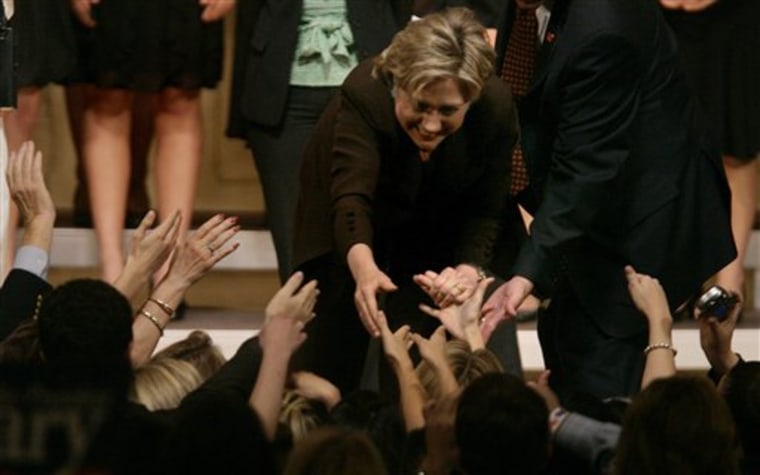Hillary Rodham Clinton has given a private clue on an issue she has refused to discuss publicly — how to preserve Social Security in the long term.
The Democratic presidential contender told an Iowa voter she would be willing to consider an idea that her Democratic rival John Edwards has been promoting — raising Social Security taxes on high-income earners.
Clinton dodged the question when asked publicly, as she has on several other topics in debates and during campaign stops. When a man in Anamosa, Iowa, asked her to describe her specific plan to bring troops home from Iraq, she said she would have to determine that when she takes office since she doesn't know what she would inherit.
The government collects money to pay Social Security benefits from taxes on each workers' earnings up to $97,500. Some have suggested that raising or eliminating that limit could be a way to bring in more money and prevent benefit cuts for future retirees.
Clinton's vague response
Clinton refused to answer whether she would consider raising the cap during a recent debate in Iowa. "I don't think I should be negotiating about what I would do as president," she said at the time.
One Iowa voter, Maquoketa Community High School government teacher Tod Bowman, pressed her for more specifics when she took audience questions during a public meeting in his hometown Sunday night. With a packed gymnasium of voters and the media watching, she didn't say more but used her response to criticize President Bush's handling of the issue and the deficits he's run up. She said her first step to improving Social Security would be to get back to fiscal responsibility.
Afterward Bowman approached Clinton so he could pose for a photo with her, introduce her to his children and discuss the issue further.
No taxes on income
She told him she didn't want to put an additional tax burden on the middle class but would consider a "gap," with no Social Security taxes on income from $97,500 to around $200,000. Anything above that could be taxed.
An Associated Press reporter overheard the conversation and discussed it with Bowman. He said he didn't agree with Clinton and felt that as someone who makes under $97,500 he pays an unfair share.
"I understand that in her world $97,000 is the middle class, but here in Iowa $97,000 doesn't qualify as the middle class," Bowman said.
Too general?
Bowman said he is a Democrat and hasn't decided whom he will support, but "she didn't strike me as earthshaking because she talked in such general senses on several different subjects." He said he understood why she didn't answer him publicly on the Social Security question.
"She doesn't want it to be public record what she says," he said. "And I don't blame her because no matter what she says, she'll be attacked."
Asked for an explanation of Clinton's thinking, spokesman Howard Wolfson said in an e-mail Thursday, "There are many ideas that are worthy of discussion, but Senator Clinton believes that we need to first focus on fiscal responsibility." Neither Wolfson nor Clinton explained what that would entail.
In a recent debate, Edwards said on the subject of the Social Security tax limit: "I do have some difference with some of my colleagues who I've heard talk about this. I think we have to be very careful to protect the middle class, so specifically — if I can be very specific — what I would do as president is I would create a protective zone between $97,000 up to around $200,000."
"Because there are a lot of firefighter couples, for example, that make $100,000, $115,000 a year," Edwards said in the debate on MSNBC. "We don't want to raise taxes on them. But I do believe that people who make $50, $75, $100 million a year ought to be paying Social Security taxes on that income."
